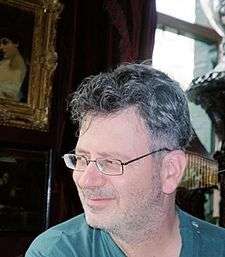Oded Goldreich
| Oded Goldreich | |
|---|---|
|
Oded Goldreich, 2006 | |
| Native name | עודד גולדרייך |
| Born |
February 4, 1957 Tel Aviv, Israel |
| Nationality | Israeli |
| Fields | Cryptography |
| Alma mater |
Technion, Weizmann Institute |
| Doctoral advisor | Shimon Even |
| Known for | Zero-knowledge proof |
| Spouse | Dana Ron |
Oded Goldreich (Hebrew: עודד גולדרייך; b. 1957) is a professor of Computer Science at the Faculty of Mathematics and Computer Science of Weizmann Institute of Science, Israel. His research interests lie within the theory of computation and are, specifically, the interplay of randomness and computation, the foundations of cryptography, and computational complexity theory.
Goldreich has contributed to the development of pseudorandomness,[1][2] zero knowledge proofs,[3] secure function evaluation,[4] property testing,[5] and other areas in cryptography[6][7] and computational complexity.[8][9][10]
Goldreich has also authored several books including: Foundations of Cryptography which comes in two volumes (volume 1 in 2001[11] and volume 2 in 2004), Computational Complexity: A Conceptual Perspective (2008), and Modern Cryptography, Probabilistic Proofs and Pseudorandomness (1998).[11]
He is married to Dana Ron, who is also a computer scientist at Tel Aviv University, and has collaborated with Ron on approximation algorithms.[5]
See also
References
- ↑ Oded Goldreich, Shafi Goldwasser, and Silvio Micali. How to Construct Random Functions. Journal of the ACM, Vol. 33, No. 4, Oct. 1986, pages 792--807.
- ↑ Oded Goldreich and Leonid Levin. Hard-core Predicates for any One-Way Function. In the proceedings of the 21st ACM Symp. on Theory of Computing, pages 25-32, 1989.
- ↑ Oded Goldreich, Silvio Micali, and Avi Wigderson. Proofs that Yield Nothing But their Validity or All Languages in NP have Zero-Knowledge Proofs. Journal of the ACM, Vol. 38, No. 3, July 1991, pages 691--729.
- ↑ Oded Goldreich, Silvio Micali, and Avi Wigderson. How to Play any Mental Game or a Completeness Theorem for Protocols with Honest Majority. In Proceedings of the 19th Annual ACM Symposium on Theory of Computing, pages 218-229, ACM, 1987.
- 1 2 Oded Goldreich, Shafi Goldwasser, and Dana Ron. Property Testing and its connection to Learning and Approximation. Journal of the ACM, pages 653--750, July 1998.
- ↑ B. Chor, O. Goldreich, E. Kushilevitz and Madhu Sudan. Private Information Retrieval. Journal of the ACM, Vol. 45, No. 6, pages 965--982, November 1998.
- ↑ O. Goldreich, and Rafail Ostrovsky. Software Protection and Simulation on Oblivious RAMs. Journal of the ACM, Vol. 43, No. 3, 1996, pages 431--473.
- ↑ B. Chor and O. Goldreich. Unbiased Bits From Sources of Weak Randomness and Probabilistic Communication Complexity. SIAM J. Comp., Vol. 17, No. 2, April 1988, pages 230--261.
- ↑ Mihir Bellare, O. Goldreich and M. Sudan. Free Bits, PCPs and Non-Approximability -- Towards Tight Results. SIAM J. Comp., Vol. 27, No. 3, pages 804--915, June 1998.
- ↑ O. Goldreich and M. Sudan. Locally Testable Codes and PCPs of Almost-Linear Length. Journal of the ACM, Vol. 53, No. 4, July 2006, pages 558--655.
- 1 2 Landau, Susan (2004). "Review of Foundations of Cryptography: Basic Tools by Oded Goldreich and Modern Cryptography, Probabilistic Proofs and Pseudorandomness by Oded Goldreich and 8 other books by various authors" (PDF). Bull. Amer. Math. Soc. (N.S.). 41 (3): 357–367.
External links
- Home page of Oded Goldreich
- Oded Goldreich at the Mathematics Genealogy Project
- Interview with Oded Goldreich
